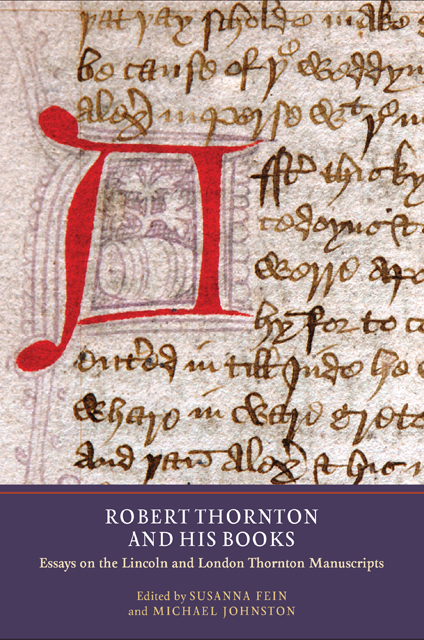Book contents
- Frontmatter
- Contents
- List of Illustrations
- List of Contributors
- Acknowledgements
- Abbreviations
- Introduction: The Cheese and the Worms and Robert Thornton
- 1 The Contents of Robert Thornton’s Manuscripts
- 2 Robert Thornton: Gentleman, Reader and Scribe
- 3 The Thornton Manuscripts and Book Production in York
- 4 The Text of the Alliterative Morte Arthure: A Prolegomenon for a Future Edition
- 5 ‘The rosselde spere to his herte rynnes’: Religious Violence in the Alliterative Morte Arthure and the Lincoln Thornton Manuscript
- 6 Constantinian Christianity in the London Thornton Manuscript: The Codicological and Linguistic Evidence of Thornton’s Intentions
- 7 Apocryphal Romance in the London Thornton Manuscript
- 8 Thornton’s Remedies and the Practices of Medical Reading
- Afterword: Robert Thornton Country
- Bibliography
- Index of Manuscripts Cited
- General Index
- York Medieval Press: Publications
3 - The Thornton Manuscripts and Book Production in York
Published online by Cambridge University Press: 28 February 2023
- Frontmatter
- Contents
- List of Illustrations
- List of Contributors
- Acknowledgements
- Abbreviations
- Introduction: The Cheese and the Worms and Robert Thornton
- 1 The Contents of Robert Thornton’s Manuscripts
- 2 Robert Thornton: Gentleman, Reader and Scribe
- 3 The Thornton Manuscripts and Book Production in York
- 4 The Text of the Alliterative Morte Arthure: A Prolegomenon for a Future Edition
- 5 ‘The rosselde spere to his herte rynnes’: Religious Violence in the Alliterative Morte Arthure and the Lincoln Thornton Manuscript
- 6 Constantinian Christianity in the London Thornton Manuscript: The Codicological and Linguistic Evidence of Thornton’s Intentions
- 7 Apocryphal Romance in the London Thornton Manuscript
- 8 Thornton’s Remedies and the Practices of Medical Reading
- Afterword: Robert Thornton Country
- Bibliography
- Index of Manuscripts Cited
- General Index
- York Medieval Press: Publications
Summary
The two manuscript anthologies inscribed by Robert Thornton of East Newton, in the North Riding of Yorkshire, remain crucial witnesses to literature in late medieval England. Lincoln Cathedral Library, MS 91 and London, BL, MS Additional 31042 provide much of what we know from this period about romances, about devotional literature, and about the relations between the two, given these manuscripts’ wide-ranging contents and their suggestive arrangements of texts. These gleanings about literary presentation and distribution have been applied to the North of England or the nation generally. However, our conclusions from the Thornton manuscripts about romance and devotional literature can be applied more accurately to York, a centre of book production that by the end of the fourteenth century rivalled London. Furthermore, these conclusions can be enriched by comparisons with another manuscript of the highest literary importance, London, BL, MS Cotton Nero A. x, the sole witness to the four poems ascribed to the Pearl poet or Gawain poet. Cotton Nero and the Lincoln Thornton manuscript share decorations that are closely identified with York in the first half of the fifteenth century, and that connection allows us to think about these two great collections as bookends to a vital place and period for the reproduction of literary texts in England from around 1400 (the likely time for production and decoration of Cotton Nero) to around 1450 (the likely time for production and decoration of the Thornton manuscripts).
Furthermore, we can use the decoration in combination with other forms of evidence to separate out likely clusters of texts that probably came to Thornton in pamphlet form, focusing our attention on works that circulated together in small anthologies in Yorkshire, if not York itself. The question of Thornton’s interests as evidenced by his manuscripts is undeniably rich and important. Equally important, though, is the evidence of mini-collections that came to Thornton as exemplars, that is, as cultural formations embedded within Thornton’s booklets and then enshrined by the larger collections and the decoration that defines them. One point that leaps out from this approach is a complex relationship between romance and devotional literature that develops, apparently deliberately, by the arrangements of their scribes.
- Type
- Chapter
- Information
- Robert Thornton and his BooksEssays on the Lincoln and London Thornton Manuscripts, pp. 109 - 130Publisher: Boydell & BrewerPrint publication year: 2014



